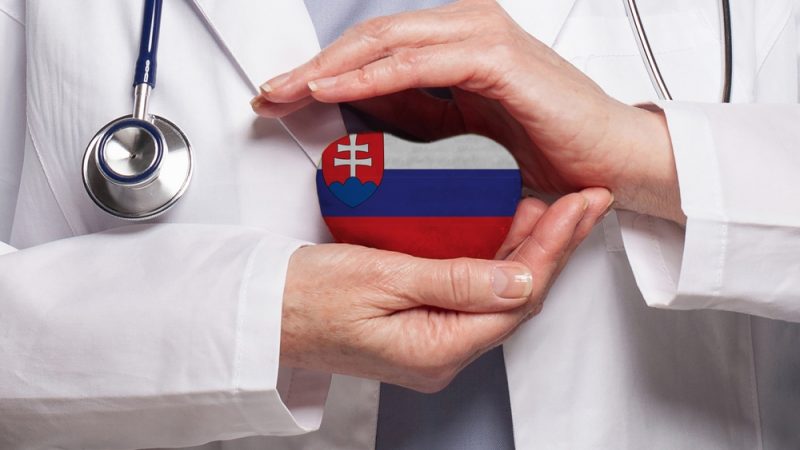Healthcare workers remain dissatisfied with Slovakia’s current fiscal consolidation plan, despite the new Health Minister Šaško’s €100 million concession. Health unions refuse to move, taking a tougher stance in negotiations.
The new Health Minister, Kamil Šaško (Hlas), is facing a baptism of fire. Šaško assumed office amidst heated consolidation measures, which hit healthcare workers’ pay increase.
At first, frustrated healthcare workers planned to stop working forced overtime and on-call hours, which go beyond the legal limits. Now, their position hardened, with doctors collecting resignations and the union representatives ready to submit them.
“We have 2,462 resignation letters from employment contracts in a total of 32 hospitals, and the number of resignations continues to rise,” said Dr Peter Visolajský, head of the Medical Trade Union Association (LOZ), on Tuesday.
The resignations are to be filed on 1 November. Given the two-month notice period, the doctors would leave hospitals on 1 January.
“Without these doctors, as Slovakia has repeatedly witnessed, the operation of Slovak hospitals is not possible,” Visolajský added.
Šaško and Visolajský are meeting to negotiate later this week.
A 100-million Euro compromise
The initial consolidation measure meant a €259 million cut from the healthcare sector allocated for healthcare workers’ salaries. In a 2022 memorandum signed by the government and LOZ, a 9.7 per cent pay increase was agreed upon. The consolidation interventions brought wage growth down to 3 per cent.
After meetings with the Finance Ministry, Šaško announced that they have agreed to allocate an additional €100 million towards salaries at the expense of increasing the state deficit.
“As part of this package, today I am offering nurses and paramedics the same salary growth conditions as they had before the consolidation was approved, and I am offering doctors a 6.4 per cent salary increase, instead of the current 3 per cent,” the Minister said on a Friday morning press briefing with President Pellegrini and reiterated his offer during an afternoon press conference he held at the Ministry.
Nurses and paramedics’ salary increase would, therefore, remain at the original 9.7 per cent boost before the consolidation. On average, doctors’ salaries would increase by €163 per month, while they were requesting 252 euros.
The Minister reaffirmed that this is not a freezing or reduction of salaries but a slightly slower growth.
“These are the conditions I am offering today, in the interest of finding a compromise, to the representatives of doctors, nurses, and paramedics, and I believe they will accept them and put an end to their pressure actions,” the Minister added.
Minister Šaško warned that if the resignations continue, he would be legitimately concerned that the 100 million might be redirected elsewhere.
“I am saying in advance that this amount is final,” Šaško stated on Friday.
The Minister finds himself in a challenging position. Either he stands firm and jeopardises healthcare provision, or he moves and weakens his position during only his third week in office.
A united front
Despite the promise to maintain the status quo for nurses’ salary growth, the Union of Nurses and Midwives (OZ SaPA) stood by the doctors and rejected any interference with the healthcare workers’ remuneration.
“The government is driving nurses and midwives away from patients’ beds, as there is no place for nurses where doctors are missing. In doing so, the government has shown that it does not value or care about the work of nurses and midwives,” their statement read.
OZ SaPA added, “The highly skilled work of Slovak nurses is in great demand in neighbouring countries, and these countries will welcome their departure from Slovakia. The saddest part is that the quality of healthcare provided to Slovak patients will suffer.”
Visolajský expressed regret over politicians’ decision to divide healthcare workers and break the 2022 memorandum agreement between doctors and the government.
“This decision opens an unnecessary conflict that LOZ has tried its utmost to avoid. We remind you that the responsibility for healthcare lies with the Minister and the government. We would prefer that the government, ministers, and the president introduce measures that would provoke dissatisfaction among financial groups rather than among healthcare workers,” he added.
Will the unions go three for three?
“Slovakia is about to experience a third round of doctors’ resignations,” Visolajský warned on Tuesday.
This would be a repeat scenario of 2011 and 2022. In both cases, the unions collected thousands of resignations and prevailed over the previous governments. However, the current dispute marks the first medical union uprising against a Fico government.
“We are no longer accepting empty promises from politicians; today, it is not just about doctors’ salaries; it is about the government finally starting to save the healthcare system in Slovakia. Failure to address this issue will affect all patients and, thus, also, the healthcare workers,” Visolajský said on Tuesday.
He continued, “That is why we have urged our colleagues to join us and submit their resignations; this is the only effective tool we have to push the government towards real solutions to the problems.”
Minister Šaško and the government have a week to find common ground with the union and avert any impact it may have on healthcare provision.
“It is unfortunate that governments only act under the pressure of doctors’ resignations,” Visolajský concluded.
[Edited by Vasiliki Angouridi, Brian Maguire]
Source link : http://www.bing.com/news/apiclick.aspx?ref=FexRss&aid=&tid=671af252e4a24b2088efa860d6f86964&url=https%3A%2F%2Fwww.euractiv.com%2Fsection%2Fhealth-consumers%2Fnews%2Fslovak-healthcare-crisis-2400-doctors-threaten-to-quit-on-1-november%2F&c=17866097675994307603&mkt=de-de
Author :
Publish date : 2024-10-24 17:00:00
Copyright for syndicated content belongs to the linked Source.
